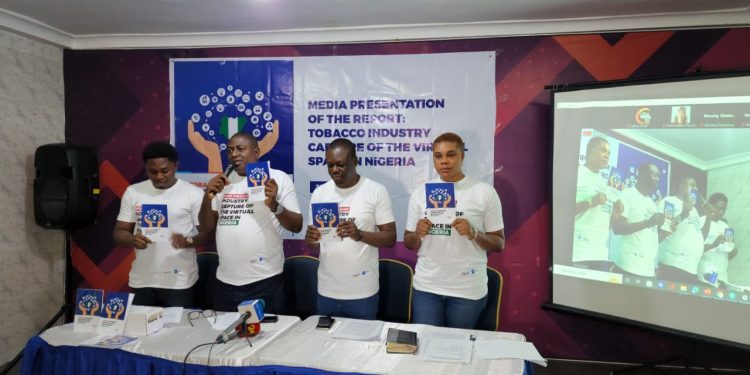The Executive Director of Corporate Accountability and Public Participation Africa (CAPPA), Akinbode Oluwafemi, has underscored the need for the Nigerian Government at Federal and State levels to regulate the activities of the Tobacco Industry, especially in the virtual space.
Akinbode disclosed this while highlighting CAPPA’s findings at the media presentation of a report titled ‘Tobacco Industry Capture of the Virtual Space in Nigeria’.
Akinbode explained that the published report exposed how the tobacco industry in Nigeria craftily uses social networking sites to burnish their image and foster partnerships with state actors and institutions in contravention of provisions of the National Tobacco Control Act 2015 and its Regulations.
Giving the highlights of the published report, Akinbode said, “Tobacco Industry’s most preferred and exploited digital and internet channels is Facebook which recorded 40%, Twitter 36%, and Youtube 14% in the period under review. This was followed by Instagram 5%, Blog/Website 3%, and Linkedin 2%.
“CAPPA found that tobacco vendors and distributors such as Smokehubng and Dasmokehub, use their social media platforms to aggressively promote sales of tobacco products and a smoking culture which relies largely on promoting content showing Nigerian music icons smoking profusely.”
According to the report, “British American Tobacco Nigeria (BATN), through its charity arm, British American Tobacco Nigeria Foundation (BATNF), Philip Morris International Nigeria Limited (PMINL) and others operate unchecked in the virtual space and use it to gain favourable public rating while mentioning nothing about the harms of their products.
“The visibility activities of the tobacco industry are mostly in the agriculture, education and entertainment sectors of the Nigerian economy which is subtly targeted at fostering engagement and collaboration with stakeholders in the sectors.”
On his part, Philip Jakpor, Programme Director at CAPPA, pointed out that, “the research found that the federal and state governments are into different forms of partnerships with the tobacco industry that portray legitimacy for industry CSR activities.
They operate nationwide but we particularly observed that Lagos and Oyo State governments amplify and endorse tobacco industry activities that make them seem socially acceptable.”
CAPPA noted that the anomalies is hinged on the existing gaps in the National Tobacco Control Act 2015 and the National Tobacco Control Regulations 2019 as it pertains to enforcing the ban on TAPS and endorsement of tobacco industry CSR activities by state actors and institutions for the manipulation of the space by the tobacco industry.
To address the gaps in the law, CAPPA urge government to protect public health policies with respect to tobacco control from commercial and other vested interests of the tobacco industry in line with Article 5.3 of the WHOFCTC and commit to implementing these measures across all branches of government that may have an interest in, or the capacity to, affect public health policies with respect to tobacco control.
The group also enjoins the government to enforce penalties for TAPS and tobacco control violations in compliance and accordance with national tobacco control and policy and also revoke all Ministries Departments and Agencies (MDA’s) collaboration with the Tobacco Industry and their front groups.

